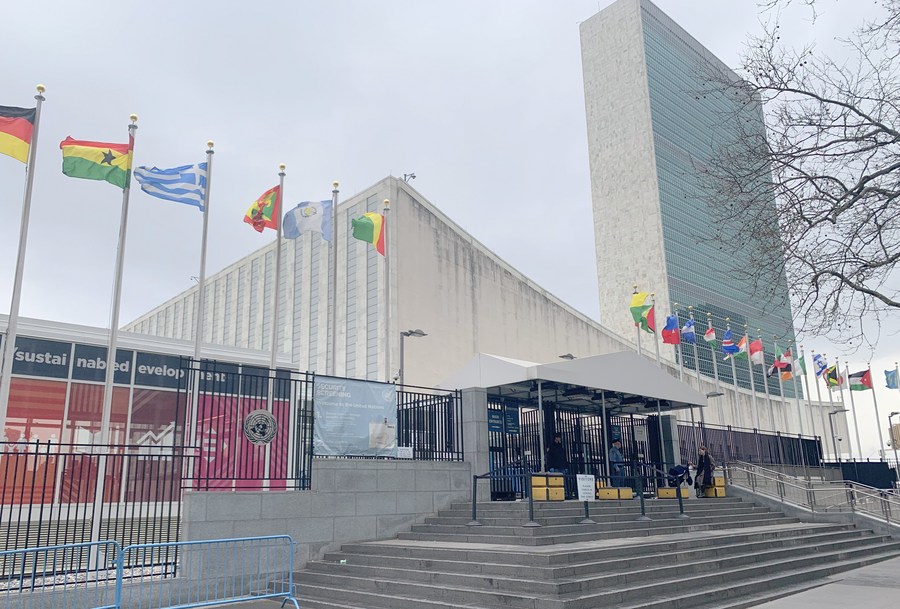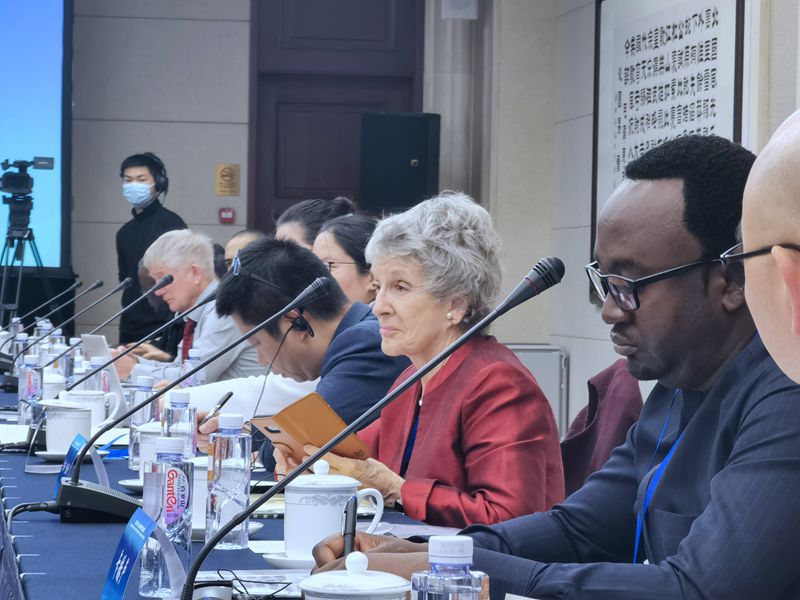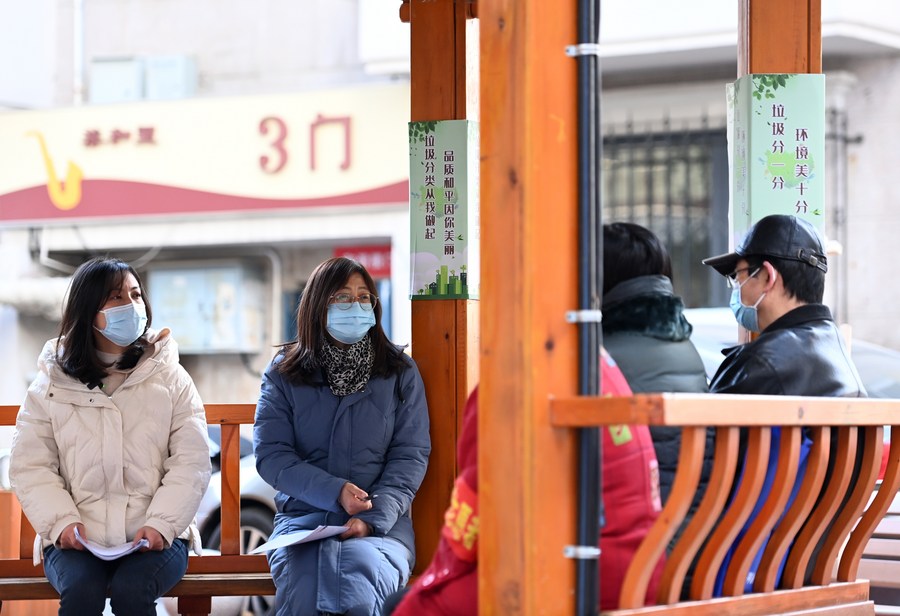Democracy Conference Reaches Consensus on Respect for Diversity

Democracy is diverse. The fundamental premise of democracy should be safeguarding the maximum benefit of people, regardless of race, gender, sexual orientation, religion, political opinion or class.
“There should not be just one door leading to the sanctuary of democracy, but many,”
“Democracy should come in many flavors, like ice cream,”…
These are views expressed by participants in the International Forum on Democracy: The Shared Human Values, held in Beijing both onsite and online on March 22-23. At the event, about 200 participants, including politicians, diplomatists, as well as scholars and other experts on democracy, from more than 100 countries, regions and international organizations brainstormed and exchanged views on democracy-related issues.
They reached the consensus that democracy is diversified and no one form is superior to another.
This year’s event is the second edition of the annual forum, which first launched in 2021. The forum was hosted by the Publicity Department of the Communist Party of China (CPC) Central Committee and the State Council Information Office and co-organized by the Chinese Academy of Social Sciences, China Media Group and China International Communications Group (CICG).
Li Shulei, a member of the Political Bureau of the CPC Central Committee and head of the Publicity Department of the CPC Central Committee, delivered a keynote speech during the opening ceremony on March 23.
“Democracy is a relentless commitment of the CPC and the Chinese people and an unswerving pursuit of China in promoting modernization,” Li said
He further stressed that democracy is the common value of humanity and serves as the foundation for building a community with a shared future for humanity. “Democracy is not only a method of domestic governance, but a principle of global governance,” he stated.

Democracy is diverse
“Democracy is diverse and there is no single way to achieve it. No two political systems in the world are identical and democracy does not come with a one-size-fits-all formula,” Li said.
He emphasized that each country should choose its own democratic path, in line with domestic conditions.
According to a report conducted by the Academy of Contemporary China and World Studies, released during the forum’s closing ceremony, among the 9,660 respondents from 23 countries, 94.3 percent believed each country should choose democracy and modernization models that suit its national conditions.
The argument resonated widely among attendees. “Successful democracies should be based on the civilizations, cultures and realities in which they develop, because many failed democracies are imported,” Zheng Yongnian, President of the Qianhai Institute for International Affairs and a professor of international affairs at the Chinese University of Hong Kong (Shenzhen), said at the forum.
When it comes to capitalism, we know that the capitalism of the United Kingdom, the United States and Northern Europe, and that of East Asia differ from one another; that should apply to democracy as well, he said.
“Democracy differs even among Western countries,” he said, “It varies from the presidential system to parliamentary system, in the U.S. it features a two-party system, while in Germany they have six to eight parties, and the system in Indonesia has more than 100 parties.”
“What traps many people’s minds today is that they regard Western-style democracy, or the competitive election, as the only form of modern democracy, but if we really look into the history of democracy, that is only one of the manifestations of democracy,” Yan Yilong, deputy dean of Institute for Contemporary China Studies at Tsinghua University, said, “It’s unnecessary to copy the so-called standard answer from Western countries as every nation has the right to explore their own democracy.”

“Past experiences tell us once Western democracy was applied in other countries, it was not necessarily successful, evidenced by the examples of Iraq, Libya and Afghanistan,” Humphrey Moshi, Director of the Center for Chinese Studies at the University of Dar es Salaam, Tanzania, said. “There are still 400 million people in poverty in Africa. In this case, when a country has more than 10 political parties with each featuring different objectives and plans, such a democratic system will harm the cohesiveness of the country and therefore is not a good system.”
Nor has Western democracy generated good economic results for some Asian nations, including Thailand, Malaysia and Indonesia, which have all been drawn into the middle class trap, Zheng said. The middle class trap is the idea that pursuing the dream of being “middle class” actually means one would be trapped in a struggle when one should aim higher.
Kalyan Raj Sharma, Chairman of the Nepal China Friendship Forum, said Nepal has been advancing its democracy by adopting an accountability system and allowing people to participate in the policy-making process to enhance transparency, which is proving effective in promoting sustainable development.
Kugiza Crispin Kaheru, Commissioner of the Uganda Human Rights Commission, believes “democracy should come in many flavors, like ice cream.” But the fundamental premise of democracy should be safeguarding the maximum benefit of people, regardless of race, gender, sexual orientation, religion, political opinion or class, he said.
“African countries lie in one continent, but we have more than one nation,” he said. “So what we have to think about is how our democracy can be more inclusive, respect the senses of belonging and identities of the majority of people and how democracy can better meet the requirements of social and economic development.”
Chinese democracy
Like many other countries, China has been exploring its own path to democracy. Li said the country had tried to implement Western democratic systems to pursue modernization beginning in 1840, but it turned out to be a failure until the CPC illuminated the light of democracy by developing whole-process democracy. The people-oriented approach has mobilized the population’s initiative and injected inexhaustible impetus into China’s modernization.
“Whole-process democracy is a great creation to explore and advance Chinese modernization,” Li said. This form of democracy integrates process-oriented with results-oriented democracy, procedural with substantive democracy, direct with indirect democracy, and people’s democracy with the will of the state, which suits China’s national conditions.
Fang Ning, a researcher in political science with the Chinese Academy of Social Sciences, said the formation and development of democracy must be based on the natural endowments and social and economic conditions of each country, the stage of its development and main tasks, as well as its historical and cultural traditions.

Right now, China finds itself in a critical period of realizing industrialization, modernization and national rejuvenation. Democracy in this new era should be able to protect people’s rights to fully mobilize the productivity, initiative and creativity of hundreds of millions of Chinese citizens. Their pursuit of a better life will eventually lead to national modernization, Fang explained.
“A Chinese-style democracy has taken form, and it differs from Western democracy,” Yury Tavrovsky, Director of the Russian Dream and Chinese Dream Analytic Center, said.
He noted China has made impressive economic achievements precisely because the country has found a development model that lives up to its traditions, present conditions and future goals.
Democracy does not work if it fails to address people’s livelihood problems, José Luis Centella, President of the Communist Party of Spain, said.
In the type of democracy China is building, the most important thing is to guarantee the people’s right to extensive participation in national affairs and ensure the exercise of power is truly supervised and controlled by the people, he said.
By building a two-way communication system between the people and governmental organizations, the former have a say in the management of their own affairs which truly empowers them, he added.
Within China, democracy is embodied as people being the masters of the country; between countries, it becomes the democratization of international relations, Li said. He stressed the country remains true to its democratic principles in international affairs as Chinese President Xi Jinping proposed the concept of building a community with a shared future 10 years ago.
Former Japanese Prime Minister Yukio Hatoyama expressed his concern about an emerging trend among some Western countries, namely the U.S., the United Kingdom and Japan, who are creating conflicts of values around the world.
He said if the values of democracy and human rights are used wrongly within the diplomatic arena, countries with different values will be discriminated against and excluded, which will in turn divide the world, defy the laws of economics and damage global prosperity.
Du Zhanyuan, President of CICG, said he opposes attempts to undermine the diversity of civilizations and obstruct the rights of other countries to choose their path of democracy, and criticized moves to take democracy as an excuse for creating division and confrontation, noting that democracy should be the common will of humanity.
 Facebook
Facebook
 Twitter
Twitter
 Linkedin
Linkedin
 Google +
Google +










